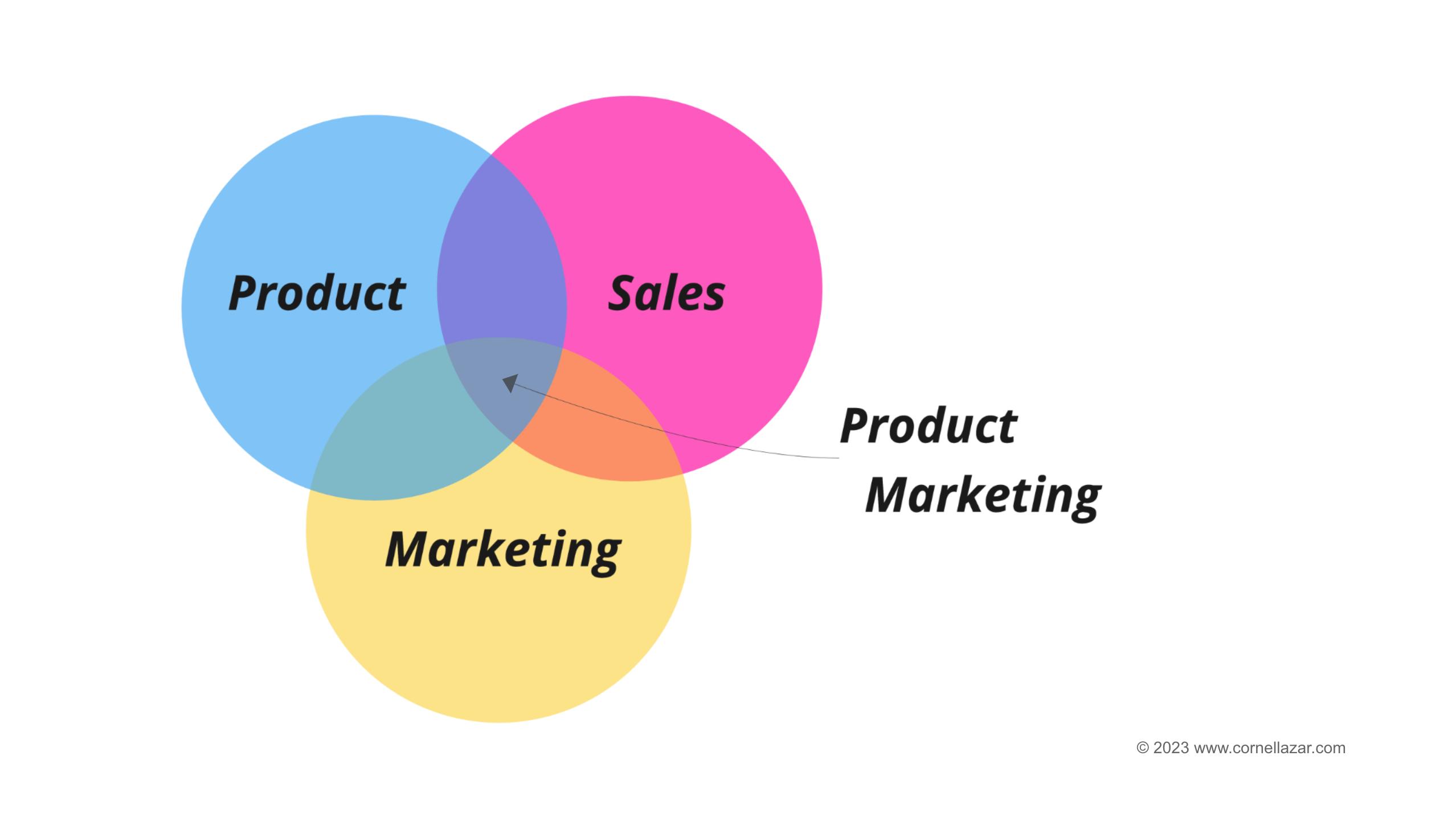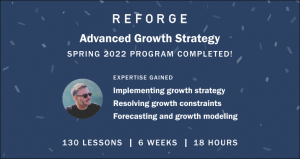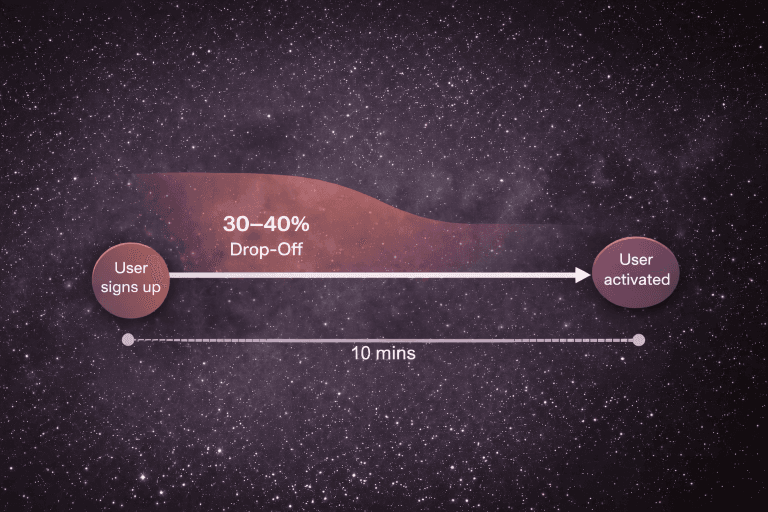In today’s fast-paced business environment, cross-functional alignment has become increasingly important.
Startups have been quick to adopt this approach, and as a result, they are often able to move faster than their larger counterparts.
However, this approach can be difficult to implement in larger organisations where silos tend to develop as the company grows.
Product Marketing = The intersection between Marketing, Product, and Sales
The intersection between Marketing, Product, and Sales is at the core of Product Marketing (PMM).
In essence, PMM and Traditional Marketing converge in their fundamental goal of understanding and meeting the needs of an audience. While Traditional Marketing focuses on promoting the brand and product as a whole, Product Marketing centres on understanding how a specific product satisfies those target audience needs.
Traditional Marketing focuses on promoting the brand and product as a whole, Product Marketing centres on understanding how a specific product satisfies those target audience needs.
"The Role of PMM in X-Functional PLG Environment" by Cornel Lazar Tweet
Functions of Product Marketing in a Product-led Company
In a product-led company, top-level product features don’t cut it for marketers to do their job convincingly. Instead, Product Marketing takes on various strategic, content, and support functions to convey resonant messaging, influence product roadmaps, develop effective campaigns, and analyse customer insights and competitive landscapes.
Key Areas Where Product Marketing Makes a Difference
User acquisition, new product revenue, and sales effectiveness are among the key areas where product marketing can make a difference.
By creating compelling stories that differentiate the product and resonate with your target market, product marketers equip sales teams, engage analysts and demand generation, and help customer service and customer success (B2B) teams deliver better support.
KYC (Know your customer)
- Build resonant messaging
- Influence the product roadmap
- Develop effective campaigns
User Acquisition
- Messaging & positioning
- Educational content
- Volume of customer stories
Sales Effectiveness
- Onboarding & collateral
- Deep customer stories
- Objection handling
New product revenue
- Market insights for product roadmap
- Product launches
- Activation & retention
Synthesise
- Top-requested product features by customer segment
- Top concerns to address from NPS feedback
- Top competitive gaps where we lose deals
- Top objections to train sales on handling
Approaches & Tools
- Existing and new datasets; quant. & qual.
- Customer interviews
- NPS analysis
- Market and customer surveys
- Win / loss analysis
- Salesforce product requests
- Competitive analysis
- Top requests from sales and success leads
- Analyst calls
The Role of Good Great Product Marketers
Great product marketers can evolve the story as the environment changes, knowing what the company is and what it is not.
They can also help with segmentation, optimise the customer journey, and prepare the go-to-market strategy for product launches.
The Importance of Storytelling in Product Marketing
Product Marketers (PMM) should ultimately be great storytellers. In essence, Product Marketing is about understanding the product’s value proposition, and answering the “so what” for your target audience.
By leveraging insights from customer interviews, NPS analysis, market surveys, and win/loss analysis, product marketers develop a compelling narrative that aims to engage customers and drive revenue growth.
The Crucial Role of Product Marketing in Cross-Functional Alignment
The Role of Product Marketing in Cross-Functional Alignment
Product marketing is the secret weapon of any organisation looking to break down silos and foster inter-departmental coordination and teamwork. It’s the glue that pulls winning messaging from each department and helps shape it and redistribute it to every team so that everyone is working from the best possible ICP/segments, value propositions, messages, and competitive intelligence.
The Evolution of Cross-Department Functions
As organisations have evolved, we’ve seen the advent of new cross-department functions like growth teams, revenue teams, and product-led sales. While these functions have helped to break down silos, product marketing remains the only role that should span all of these departments.
The Unique Position of Product Marketing
Product marketing is uniquely positioned to bridge that gap between marketing, sales, and product.
Deep product understanding and feature and benefit translation into compelling messaging that resonates with the target customers.
PMM’s are also uniquely placed to support the sales teams understand the product’s unique value proposition and how it compares to competitors. You could go as far as arguing, PMM can make a sales team look less salesy, and more of a solutions partner.
You could go as far as arguing, PMM could help make a sales team look less salesy, and more of a respected Solutions Partner.
"The Unique Position of Product Marketing" by Cornel Lazar Tweet
Staying Ahead of the Curve
In addition to bridging the gap between departments, the PMM conducts market research and stays up-to-date on industry trends that can help innovate products meeting the changing needs of your customers.
The Key Components of Product Marketing
Market Research
Market research is a crucial aspect of product marketing. It involves understanding the target audience, their needs and preferences, and the market trends that affect their buying decisions. By conducting market research, product marketers can develop a deep understanding of the customer’s needs and tailor their marketing strategies accordingly.
Product Positioning
Product positioning is the process of developing a unique value proposition for a product or service. It involves understanding the product’s unique features and benefits and communicating these to the target audience in a way that resonates with them. Product positioning helps businesses to differentiate their products from competitors and make them more attractive to customers.
Messaging and Communication
Messaging and communication are critical components of product marketing. It involves developing clear, concise, and compelling messaging that resonates with the target audience. This messaging should be consistent across all marketing channels and should be tailored to the customer’s needs and preferences.
Pricing and Packaging
Pricing and packaging are key components of product marketing. It involves developing pricing strategies that are competitive and appealing to customers. It also involves developing packaging that is visually appealing and communicates the product’s unique features and benefits.
Go-to-Market Strategy
The go-to-market strategy is the final component of product marketing. It involves developing a comprehensive plan for launching the product and reaching the target audience. This includes developing marketing campaigns, identifying the best marketing channels, and coordinating with other stakeholders, such as sales teams and product managers.
Let's bring it all together ...
In any organisation, but particularly with PLGs, product marketing plays a crucial role in ensuring the success of a company’s growth.
Product marketing communicates the value proposition of the product to your target audience.
The best PMM’s can’t succeed if the organisation doesn’t create the right environment.
Cross-functional enablement is not just an objective but requires to meticulously top-down sign-off and support to calibrate your organisation’s matrix to unlock the opportunities of a Product Marketing function.















